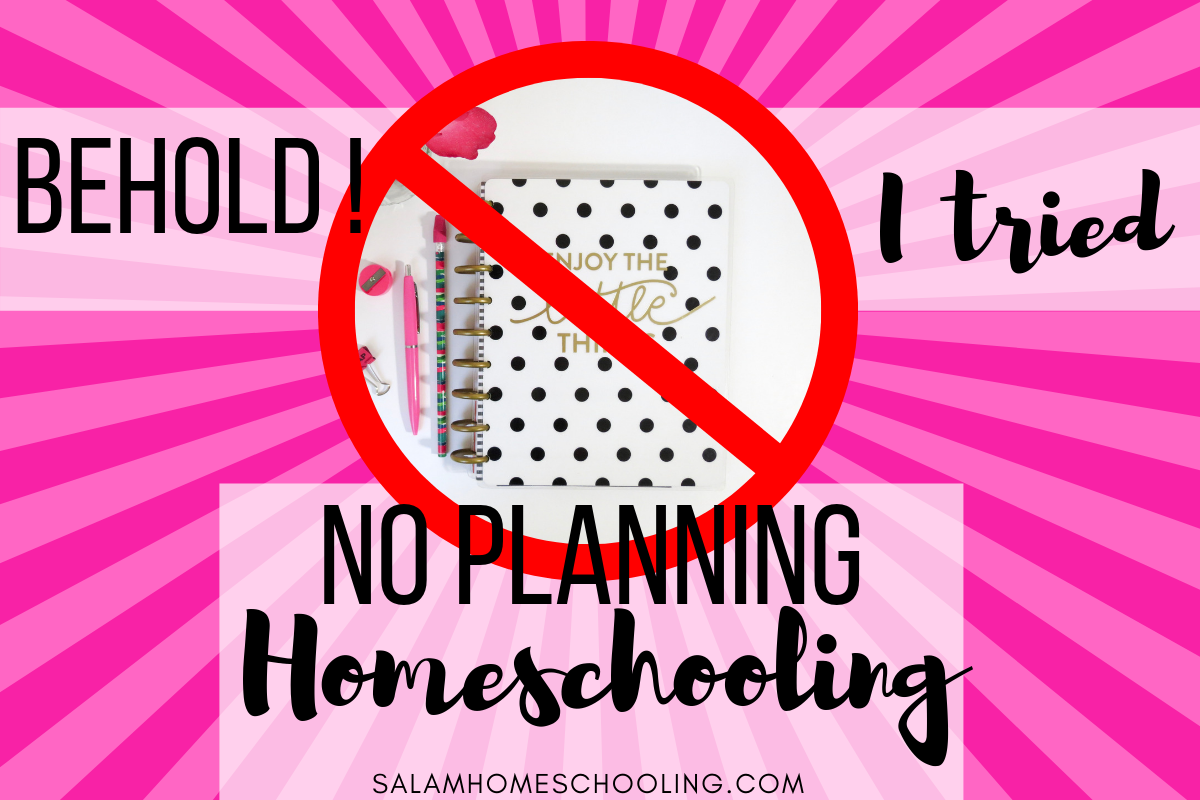Assalamo alaykum and welcome.
Download your FREE TA-DAH list HERE
We all have some really good homeschooling streaks: we are all nicely settled into the routine, learning takes place, the parent feels reasonably in control and everybody is pretty happy. And then… BOOM! Staying guests. A family trip. Eid. A stomach bug. The routine is broken. Maybe it is already a week after that important celebration or milestone for which you took time off and you were expecting to definitely have resumed by now… but you haven’t.
Whatever the cause of the disruption, the problem is one and the same: you cannot restart.
The kids don’t want to touch the curriculum with a barge pole and – making things even harder – neither do you!
Naturally, I have been in this predicament a number of times, so I came up with a little action plan for when your homeschool is struggling to get going again.
If you think – as I probably would have thought too, at least initially – that this might take a whole week, and that’s a long time not to be doing “actual school work”, then try to force everybody back into it and see what fun it is! (Just kidding! Don’t do that. Bear with me and read on, insha’Allah).
Task 1: Seek help where help is to be found
Nowadays, ranting seems to have acquired human right status; when things don’t go their way, many take to social media and indiscriminately “let it out” to a bunch of strangers or people that – for the most part – are not very relevant in their life. The believer, on the other hand, remembers that she has a Lord who is Merciful and Who manages all affairs with the utmost wisdom.
Don’t vent. Instead, seek help where you can find it. Seek help from Allah, as in the heartfelt advice that the Prophet Muhammad (salla Allahu alayhi wa sallam) gave to Abdullah ibn Abbas (rady Allahu anhuma):
“…Be mindful of Allah and Allah will protect you. Be mindful of Allah and you will find Him in front of you. If you ask, then ask Allah alone; and if you seek help, then seek help from Allah alone. […]”
You have a Lord that loves you to ask Him.
Anas (rady Allahu anhu) narrated that the Prophet (salla Allahu alayhi wa sallam) said:
اللَّهُمَّ لَا سَهْلَ إِلَّا مَا جَعَلْتَهُ سَهْلًا ، وَأَنْتَ تَجْعَلُ الْحَزْنَ إِذَا شِئْتَ سَهْلًا
“Oh Allah, there is no ease except in that which You have made easy; and, if You wish, you can make the difficulty easy.”
Collected by Ibn Hibban, graded saheeh by al-Albani
You don’t have to necessarily be hit by a major calamity in order to make these amazing words yours; they are perfectly suitable for anytime you feel deflated and at a loss when it comes to homeschooling and parenting (or life) in general.
Task 2: Reconnect
Often, when there is a break in our homeschool, parent and children each become absorbed in doing their own thing, typically those things they feel they don’t have enough time to delve into when homeschooling is on.
It can be hard to go back to structured learning while the interest for this activities we have thrown ourselves into is still so alive.
It is a good idea to do something to reconnect with our children first; in other words: do “nothing” together. I am talking about premeditated, intentional “nothing”: play games, bake a cake and invite friends, read aloud, go for walks… ask them if there is something they would like to do together and indulge in it without the pressure of having to “get work done”.
Task 3: Accept reality
Take a step back and accept that our life is made of days and each of them may come with change.
This is true of every aspect of our lives and we can certainly observe it in the patterns of our family life. Things did not change because you were unable to maintain them: they changed because such is the nature of our existence on this earth. And our nature, as human beings, is to pick ourselves up, reassess things and carry on, insha’Allah.
Your homeschool is not a regimented institution. Your children are not in the army, nor are they in a conventional school where “they have to [fill blank]”. It is certainly not your job to make it like that!
Your homeschool does not need to be flawless in order to be an absolutely brilliant place of knowledge and growth. Break away from that mentality if you find it is affecting you and let go of the guilt.
There was a time when change in our homeschooling setup, caused me severe insecurity and even upset me. Part of the solution to that is to put our trust in Allah and know that when He closes a door, something better for us must be on the horizon.
Task 4: Make a TA-DAH! List
We are all familiar with the concept of a “to-do” list; well, a “ta-dah” list is the opposite: instead of writing down the things you are yet to do, list what you have already achieved!
You can compile one for each child and also one for yourself as a parent and educator.
Alhamdulillah, sometimes you have to write it down to truly see how far you have come. Having this list in front of you will consolidate the notion that you have been an effective teacher and you did facilitate learning for your children.
This activity is guaranteed to encourage you and make you feel more positive about this whole homeschooling business!
Involve your children and physically write down all the amazing things that they have learned about and all the skills they have mastered.
Celebrate all the lightbulb moments, all the things – big and small – that they remember feeling happy or proud about. Include every little growth experience you can think of. From learning to tie shoelaces to showing ability to forgive; from learning how to say “hello” in a foreign language, to mastering the rules of checkers; from starting to offer the fajr prayer at its time, to learning to do a load of laundry; from perfecting the ability to shower without completely flooding the bathroom, to memorizing that hadeeth that will stay with them forever.
You, mom, do it too. Have a list to record your own learning and growth. You are in as much need of it as your children are!
Download your FREE TA-DAH list HERE

Task 5: Face the curricula
At this point you enjoyed a good dose of bonding with your children and the much needed “pat on the back” that is your TA-DAH! list. You must now take stock of the materials you were using before things ground to a halt.
Don’t worry: you are ready.
Armed with a big cup of coffee – quietly creep up to the bookshelf/drawer/basket, so not to spook the books, especially after they have been abandoned in their environment for so long and are no longer used to human contact. You might find it useful to have a cookie at hand too.
Seriously, it won’t be that hard. The books won’t bite you.
Get them all out.
All you need to do it separate what has worked well for you from what did not; what you want to work with now and what might be more suitable for a later time. Decide what to carry on with and what to abandon. Streamline the whole system by reducing the materials to a minimum (what is needed as opposed to what would be lovely to also incorporate, if you see what I mean).
Homeschoolers tend to be great book lovers, educational philosophy hoppers and sometimes curriculum hoarders, but if a certain method/book/style (even – temporarily – a subject!) is putting you off resuming your homeschool, ditch it!

Task 6: Freshen things up
Introduce a new, fresh, desirable subject to replace something you are taking a break from (gardening? Spanish? design?…). Try out a new approach to homeschooling (unschooling? Workboxes? Charlotte Mason? …). If it is feasible in terms of family routine (and budget), sign your kids up for a new activity. Include videos or documentaries to supplement your textbooks. Start (or restart) having regular poetry tea-times! (those really reinvigorate our homeschool, alhamdulillah!). Make life skills and/or handiwork part of your homeschool.
You know your children well, so you may want to surprise them with the above or you might brainstorm with them and involve them in the decision process.
Ask your kids what they are curious about, which subjects they would like greater focus on and what activities they would like to try out or allocate more time to.
Jot down everything. If your kids are anything like mine, there is bound to be some ideas that are very, very much out there. Do not dismiss those either: just because you are unable to take your children to space or coach them to kung fu mastery, that doesn’t mean you can’t learn about it. In any case, a few years down the line, it will be delightful to read that jetpack building and mining for gold in your backyard were part of someone’s plans.
Task 7: Plan for relief, not torture
You have tightened the bond between you and your students; you celebrated successes and accepted limits; you narrowed your focus by selecting the materials that you intend to use; you ignited interest and fuelled the will to learn; you breathed new life into your homeschool, kept yourself adequately caffeinated… and sprinkled the whole thing with du’a to Allah for ease and guidance.
It is now time to put it to paper. Planner paper, scrap paper, digital “paper”… whatever works best or appeals more to you. Make sure that planning your homeschool is not a task that overburdens you. It is worth spending a few moments figuring out how you want to plan to make your life easier, and not to follow what you perceive to be a winning planning methodology.
For example, not everybody finds it useful to lesson plan, and, even if you do, how detailed do you want your plans to be? Make it yours. Making it yours meaning that you might decide not to write it down at all.
If you wish to write your plan, start small: distribute little chunks of work to each of your homeschooling days for the coming week, to test your way of planning is suitable to your needs and easily manageable before committing any further to it.
Once you are happy, you may proceed to plan months ahead or even the whole year. Personally, I never dare to go that far.
Actually, it is not a matter of “daring”: it is just knowing that, when we are all settled and the whole system is running smoothly… BOOM! A 3 days conference to attend. My Arabic exams. Grandma coming to visit for a week. A spell of awesome weather and you just can’t stay indoors… aaand we will be back to TASK 1!
Does your homeschool ever suffer disruptions or runs out of steam?
What do you do to get started again? Share your tips in the comments below!
















